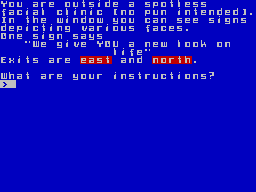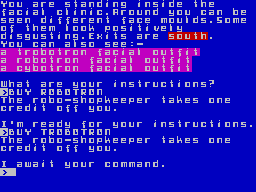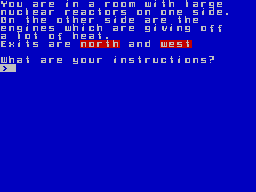Retro Replay Review
Gameplay
Crystal Quest delivers a unique blend of exploration, strategy, and text-based interaction that will appeal to both adventure veterans and newcomers. The core mechanic revolves around the classic VERB NOUN input system, inviting you to type commands like “GO ENGINE ROOM” or “USE SWITCH” to manipulate the environment. Each command feels responsive and thoughtfully designed, giving you a genuine sense of control as you navigate the USS Spectrum’s malfunctioning corridors and distant alien worlds.
(HEY YOU!! We hope you enjoy! We try not to run ads. So basically, this is a very expensive hobby running this site. Please consider joining us for updates, forums, and more. Network w/ us to make some cash or friends while retro gaming, and you can win some free retro games for posting. Okay, carry on 👍)
The urgency of a failing warp drive adds a thrilling pressure to your actions. You’re not merely wandering aimlessly—every minute counts as you plot a course to the coordinate system that will hurl you into a far-off galaxy. Along the way, you encounter a host of puzzles: rerouting power to unlock sealed doors, deciphering alien signage to find hidden crystal chambers, and negotiating traps set by hostile robots and wildlife. These challenges strike a careful balance between brain-teasing and fast-paced decision-making, keeping the tension high without ever feeling unfair.
Combat in Crystal Quest is refreshingly straightforward yet deeply satisfying. Rather than relying on complex combat trees, you use simple attack and defend commands that become more sophisticated as you acquire new weapons and upgrades. This minimalistic approach ensures that the focus stays on exploration and narrative development, while still offering memorable skirmishes against alien sentries and mechanical guardians. Overall, the game’s pacing feels just right, with new mechanics introduced steadily to maintain engagement through every stage of your mission.
Graphics
Though Crystal Quest primarily embraces a text-driven interface, its graphical presentation helps bring the story to life in subtle yet effective ways. Decorative borders that mimic Starfleet console panels frame the text, and occasional illustrations of alien flora or the USS Spectrum’s bridge offer visual relief between lengthy narrative passages. These stylized touches reinforce the sci-fi atmosphere without overwhelming the core text-adventure experience.
Transitions between locations are accompanied by simple but evocative animations: a flicker on the warp-drive schematics when you reroute power, or schematic overlays that pulse in sync with your heart rate during tense encounters. These effects may seem modest by modern 3D standards, but they add a layer of immersion that text alone can’t achieve. The developers have clearly prioritized clarity and atmosphere over flashy visuals, which suits the game’s retro-inspired design philosophy.
Color palettes are used sparingly but purposefully—cool blues and silvers dominate ship interiors, while each alien planet exhibits a distinct hue reflecting its ecosystem. The red glow of malfunctioning conduits heightens the sense of impending danger, and the soft purples of the distant galaxy you finally reach feel like a reward after all your trials. It’s a cohesive visual language that supports the narrative without ever pulling you out of the adventure.
Story
At the heart of Crystal Quest lies a compelling narrative reminiscent of classic Star Trek adventures. Humanity faces extinction unless a serum—synthesized from three rare crystals—can be assembled. You command the USS Spectrum under a strict deadline: its warp drive is dying, and every system failure inches you closer to being stranded in deep space. This ticking clock propels the story forward and gives real weight to each decision you make.
Traveling from the Spectrum’s engine room to uncharted worlds, you meet a wide array of characters: alien diplomats, rogue robots, and hermit scientists who hold fragments of the crystal’s lore. Dialogue trees allow you to engage in meaningful interactions—negotiate safe passage, trade for vital components, or even convince an alien warlord to join your cause. Your choices influence not only the immediate situation but also the overarching fate of the galaxy, adding replay value as you explore alternative approaches.
The writing balances urgency, humor, and moral nuance. Occasional quips from your first officer lighten the mood between harrowing escapes, while ethically ambiguous encounters force you to consider the larger consequences of your actions. When you finally locate each crystal, the sense of accomplishment is magnified by the months—or in some cases, dozens of in-game hours—you’ve invested. It’s a narrative that rewards careful exploration and thoughtful decision-making.
Overall Experience
Crystal Quest is a masterclass in modern text-adventure design, blending nostalgic gameplay mechanics with enough fresh ideas to feel entirely contemporary. The ticking warp-drive clock keeps tension high, while the steady drip of new commands, puzzles, and story twists ensures you’re never idle. Fans of sci-fi will find themselves thoroughly immersed in the Star Trek–style universe, complete with interstellar politics and high-stakes exploration.
While the minimalistic graphics won’t win any awards for raw visual fidelity, they serve the game’s strengths by reinforcing mood and atmosphere without distracting from the text-driven core. Every element—from the console-like UI frames to the color-coded planet schemes—works in harmony to create a cohesive, engrossing experience. And the intuitive VERB NOUN input system proves that powerful immersion doesn’t require a complex interface.
Whether you’re a seasoned adventurer or new to interactive fiction, Crystal Quest offers a richly detailed world to explore, meaningful choices to ponder, and a story that resonates long after the final crystal is secured. It stands as a testament to the enduring appeal of narrative-driven games, and it’s one quest you won’t want to abandon until humanity is saved.
 Retro Replay Retro Replay gaming reviews, news, emulation, geek stuff and more!
Retro Replay Retro Replay gaming reviews, news, emulation, geek stuff and more!









Reviews
There are no reviews yet.